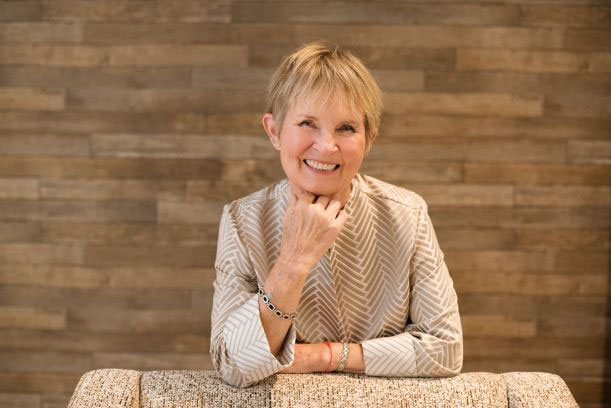When I turned on the radio this morning, the announcer was saying, “Hope is a good thing, maybe the best of things, and no good thing ever dies.” (Remember who said that? I didn’t, but when I looked it up, it was Andy Dufresne in The Shawshank Redemption.) Do you agree with that? Do you agree that hope may be the best of things? Also, do you believe that no good thing ever dies? I’m not so sure. Does it make a difference if “hope” is a verb, or a noun, or an adjective?
Women Over 55: What Does “Hope” Mean to You?
Let’s start with the adjective
The other day I was thinking about hope chests. Do young women still have hope chests? My guess would be that they don’t, but I don’t know. Did you have one? I didn’t, but some of my friends did. What was in them? When I Googled that question, things like a special dress, bed and table linens, and dishware came up. And when I asked, “What is in a modern hope chest?” some of the same answers came up—even though in my experience many young people today barely have a dining room table let alone linens for it. If you were to make yourself a hope chest today, what would you put in it? Would there be material possessions, or would there be intangibles like good health for your family and loved ones?
What about “hope” as a verb?
“I hope we’ll have good weather for the picnic.” Or what if a student you know said “I hope I’ll get good grades next term”? In both cases it sounds as if there is nothing the person can do about it. When it comes to the weather, that’s probably true: I can make contingency plans, I can watch the weather forecast and reschedule the picnic if necessary, but I can’t change the weather on that day.
Whether or not the student gets good grades, however, is largely up to her. Is hoping for something a subtle way of not assuming any responsibility for it as in “I hope we’ll end systemic racism in this country in my lifetime”? The underlying assumption seems to be that’s there’s nothing I can do about it, but I hope it happens. (Note: if you feel that way about systemic racism, please see Do the Work by W. Kamau Bell & Kate Schatz.)
If we take “hope” as a noun, what do we get?
“I have hope my cancer won’t recur.” We can all support that sentiment for someone. But what if the person makes a declaration instead: “My cancer is gone and it will not recur.” Which of those statements has more impact? I’m not saying we always can change the course of a disease, but I do think the energy behind the second statement makes it more likely to come true.
So, although I like the concept of “hope,” for me it’s a bit of a mealy word. It suggests no personal agency, that personal responsibility is impossible. Compare “hope” to “intention” or “expectation.” Is there any more personal agency in those words? Do these sentences feel any different to you: “I hope to go tomorrow” as compared with “I intend to go tomorrow”? Of course the strongest is “I am going tomorrow.”
Why am I making such a big deal of this?
Sometimes when I talk to women about Prime Spark, my project for women over 55, I can hear the resignation in their voices as they describe where they are in life. Often, as victims of gendered ageism, they’ve been forced out of a job they are very good at, or they’ve left such a job because they just didn’t want to deal with the ageist pressure any longer.
How many times do we need to hear “When are you going to retire” or “Jane [who is 32] was given the promotion rather than you because she brings a new energy to the group”? Ageism is rampant in our society, and it often affects women even more severely than men with devastating effects. You can hope this changes, or you can begin to actively do something about it.
How Can We Do Something?
Stop buying those “funny” birthday cards that make fun of and demean older people. Who actually is the butt of that joke? We no longer have racist cards, and even sexist ones are gradually going out of fashion, but older people are still fair game. So, don’t buy those cards ever again. If you’re standing at a counter being ignored, you can say, “Excuse me, I was next.” If someone “baby-talks” you (e.g., “Hon, the information you’re looking for is over there”), you can say, “Thanks for the endearment, but we’re not dear to one another,” or something less caustic that you think of.
In other words, we need to stand up for ourselves and never again accept any comment or behavior that is aimed at us solely because of our age. Is this easy to do? No, it is not. The recipient of your response often will become defensive, but maybe they’ll learn something, and at least you have stayed strong. Good luck! Please let me know how it goes; I’d love to hear from you.
Learn More…
The Prime Spark Membership Community is designed for women 55 (or close) and older to support one another. We learn and grow together while furthering the mission of Prime Spark. Membership currently is closed. If you’re interested in joining, please send an email to [email protected] and ask to be placed on the waitlist.
We will begin another Prime Spark Women’s Story Circle later in the year. If you’re interested in knowing more about that or would like to register, please send an email to [email protected].
Sara Hart, PhD, is an author, speaker, and coach. She is leading the charge to change how older women are seen and treated in our society. She is the creator of Prime Spark, a movement to transform how women over 55 take responsibility for their futures. Sara is the author of three books. She also has over forty years of experience in leadership development, coaching, and building thinking environments. She was the director of training and development for a Fortune 100 company. Sara was also an executive director of the Institute for Women and Technology. To learn more about claiming your power as a senior woman, visit Prime Spark today!


Recent Comments